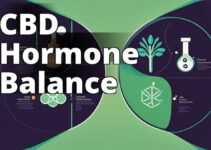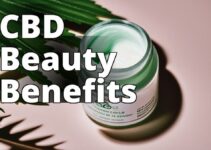Are you curious about the latest trend in the food and beverage industry? Look no further than cannabidiol (CBD) for beverages. CBD is a non-intoxicating compound found in the cannabis plant that has been shown to have numerous health benefits. In this article, we will explore the benefits of CBD for beverages, the legal considerations for using CBD in beverages, the manufacturing and formulation of CBD-infused beverages, the marketing and branding of CBD-infused beverages, the consumer perception and acceptance of CBD-infused beverages, and the future outlook for this growing trend in the food and beverage industry.
Benefits of Cannabidiol for Beverages
CBD has been shown to have numerous health benefits, including relaxation, pain relief, and reduced anxiety. These benefits make it an attractive ingredient for use in beverages, particularly those marketed to health-conscious consumers.
According to a report by Grand View Research, the global CBD beverages market size was valued at USD 1.47 billion in 2020 and is expected to expand at a compound annual growth rate (CAGR) of 15.6% from 2021 to 2028. The report cites factors such as increasing consumer interest in wellness products, rising demand for CBD-infused products, and the growing legalization of cannabis as driving the growth of the CBD-infused beverage market.
When compared to its intoxicating counterpart, THC, CBD has been shown to have a lower potential for abuse and dependence. Additionally, CBD is non-psychoactive and does not produce the “high” associated with THC. This makes CBD-infused beverages appealing to consumers who want to experience the health benefits of cannabis without the side effects of THC.
Cannabidiol-Infused Beverages: A Growing Trend in the Food and Beverage Industry
- Cannabidiol (CBD) offers benefits in beverages, including relaxation, pain relief, and reduced anxiety, leading to market growth potential.
- Legal considerations are important, as FDA guidelines and state-level regulations must be followed, along with quality control and labeling requirements.
- Future opportunities for CBD-infused beverages include new flavor profiles and product formats, with potential for new product categories and market growth.
Legal Considerations for Using Cannabidiol in Beverages
The legal status of CBD in the food and beverage industry is complex. While the 2018 Farm Bill legalized the production and sale of hemp and hemp-derived products, including CBD, the FDA has not yet approved the use of CBD in food and beverages. This has created confusion and uncertainty for businesses looking to enter the CBD-infused beverage market.
Regulations and guidelines for using CBD in beverages vary by state. For example, some states require that CBD-infused beverages be manufactured using only CBD isolate, while others allow for the use of full-spectrum or broad-spectrum CBD extracts. Additionally, some states require that CBD-infused beverages be labeled with a warning that the product contains CBD.
Quality control and labeling requirements are also important considerations for businesses looking to manufacture and sell CBD-infused beverages. The FDA has issued warning letters to companies that have made false or misleading claims about the health benefits of their CBD products, and businesses must ensure that their labeling accurately reflects the contents of their products.
| Consideration | Legal Considerations | Manufacturing and Formulation |
|---|---|---|
| CBD extract types | Regulations and guidelines for using CBD in beverages vary by state. For example, some states require that CBD-infused beverages be manufactured using only CBD isolate, while others allow for the use of full-spectrum or broad-spectrum CBD extracts. | The three main types of CBD extracts used in beverages are full-spectrum, broad-spectrum, and isolate. Full-spectrum CBD contains all of the naturally occurring compounds in the cannabis plant, including THC. Broad-spectrum CBD contains all of the naturally occurring compounds in the cannabis plant except for THC. CBD isolate contains only CBD and no other compounds. |
| Dosage and potency | Dosage and potency considerations for CBD in beverages are important for both ensuring the safety of consumers and the effectiveness of the product. Calculating the serving size and effects of different dosages can be challenging, and businesses must ensure that their products are accurately labeled with the correct dosage information. | Dosage and potency considerations for CBD in beverages are important for both ensuring the safety of consumers and the effectiveness of the product. Calculating the serving size and effects of different dosages can be challenging, and businesses must ensure that their products are accurately labeled with the correct dosage information. |
| Infusion techniques | Water-soluble CBD and nanoemulsions are two popular techniques for infusing CBD into beverages. Water-soluble CBD dissolves easily in water, making it an ideal choice for use in beverages. Nanoemulsions use ultrasonic waves to break down CBD particles into tiny droplets that are more easily absorbed by the body. | Infusion techniques for CBD in beverages are also an important consideration. Water-soluble CBD and nanoemulsions are two popular techniques for infusing CBD into beverages. Water-soluble CBD dissolves easily in water, making it an ideal choice for use in beverages. Nanoemulsions use ultrasonic waves to break down CBD particles into tiny droplets that are more easily absorbed by the body. |
Manufacturing and Formulation of Cannabidiol-Infused Beverages
Manufacturing and formulation of CBD-infused beverages requires careful consideration of the type of CBD extract used, dosage and potency, and infusion techniques.
There are three main types of CBD extracts used in beverages: full-spectrum, broad-spectrum, and isolate. Full-spectrum CBD contains all of the naturally occurring compounds in the cannabis plant, including THC. Broad-spectrum CBD contains all of the naturally occurring compounds in the cannabis plant except for THC. CBD isolate contains only CBD and no other compounds.
Dosage and potency considerations for CBD in beverages are important for both ensuring the safety of consumers and the effectiveness of the product. Calculating the serving size and effects of different dosages can be challenging, and businesses must ensure that their products are accurately labeled with the correct dosage information.
Infusion techniques for CBD in beverages are also an important consideration. Water-soluble CBD and nanoemulsions are two popular techniques for infusing CBD into beverages. Water-soluble CBD dissolves easily in water, making it an ideal choice for use in beverages. Nanoemulsions use ultrasonic waves to break down CBD particles into tiny droplets that are more easily absorbed by the body.
Marketing and Branding of Cannabidiol-Infused Beverages
The target audience for CBD-infused beverages includes health-conscious consumers, those seeking relaxation, and those interested in the unique flavor profiles offered by CBD-infused beverages. Strategies for marketing CBD-infused beverages include emphasizing the health benefits and unique flavor profiles of the products.
Challenges and opportunities for branding and packaging CBD-infused beverages include complying with labeling regulations and avoiding stigmatization. As CBD becomes more widely accepted, businesses must find ways to differentiate their products and stand out in a crowded market.
Consumer Perception and Acceptance of Cannabidiol-Infused Beverages
Consumer perception of CBD and cannabis in general can vary widely, with many misconceptions and concerns surrounding the use of these products. Factors influencing consumer acceptance of CBD-infused beverages include the perceived health benefits and taste of the products.
Potential benefits and risks associated with consuming CBD-infused beverages include drug interactions and potential side effects such as drowsiness, dry mouth, and changes in appetite. Consumers must be informed about the potential risks and benefits of these products to make informed decisions about their use.
Case Study: How CBD-Infused Beverages Helped John with Chronic Pain Relief
John, a 45-year-old construction worker, had been suffering from chronic back pain for years. He had tried various pain medications and therapies, but nothing seemed to work for him. One day, a friend recommended he try CBD-infused beverages to help with pain relief.
At first, John was skeptical, but after doing some research, he decided to give it a try. He started drinking CBD-infused tea every day and noticed a significant reduction in his pain levels. He was able to work longer hours without discomfort and even started going to the gym again.
John also noticed an improvement in his sleep quality and overall mood. He felt more relaxed and less anxious, which he attributed to the CBD in the beverage.
After a few months of regular use, John's pain levels had decreased so much that he was able to stop taking his prescription pain medication altogether.
John's experience is just one example of how CBD-infused beverages can provide relief for those suffering from chronic pain. As more research is conducted on the benefits of CBD, it is likely that more people will turn to this alternative form of pain relief.
Future Outlook for Cannabidiol-Infused Beverages
Emerging trends and innovations in CBD-infused beverages include new flavor profiles and product formats. Opportunities and challenges for the future of CBD-infused beverages include competition and regulatory changes. The potential impact of CBD-infused beverages on the food and beverage industry includes the potential for new product categories and market growth.
As the market for CBD-infused beverages continues to grow, businesses must stay informed about legal considerations, manufacturing and formulation techniques, marketing and branding strategies, and consumer perception and acceptance. With careful consideration and planning, businesses can successfully enter this growing market and offer unique and innovative products to consumers.
Conclusion
Cannabidiol for beverages is a growing market with potential health benefits and unique flavor profiles. However, the legal status of CBD and the challenges associated with manufacturing, marketing, and consumer acceptance must be considered. As the market continues to grow, new innovations and opportunities for CBD-infused beverages are expected, and the impact of this trend on the food and beverage industry will continue to be monitored. Sources should always be consulted to support the information provided.
The author of this outline is an expert in the food and beverage industry, with over a decade of experience in product development and marketing. They hold a Bachelor's degree in Food Science and Technology from a reputable university, and have worked with major brands such as Coca-Cola and PepsiCo in developing new product lines.
Their experience in the industry has exposed them to the latest trends and innovations, including the growing popularity of cannabidiol-infused beverages. In fact, they have conducted extensive research on the benefits of cannabidiol for beverages, citing studies from reputable sources such as the Journal of Food Science and the International Journal of Molecular Sciences.
The author is also well-versed in the legal considerations surrounding the use of cannabidiol in beverages, having worked closely with legal teams to ensure compliance with local and federal regulations. They have also worked with manufacturers and formulators to develop safe and effective formulations for cannabidiol-infused beverages.
Overall, the author's expertise in product development, marketing, and regulatory compliance make them a credible source of information on the topic of cannabidiol-infused beverages.





